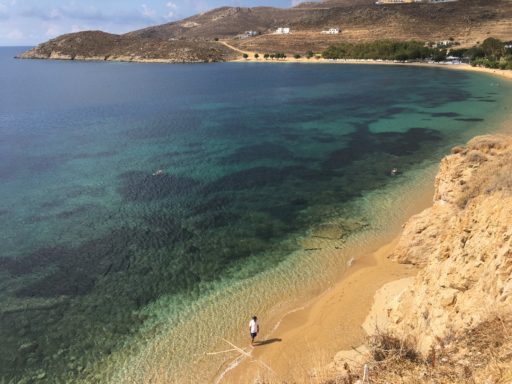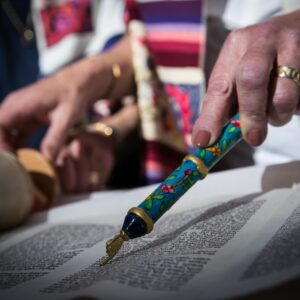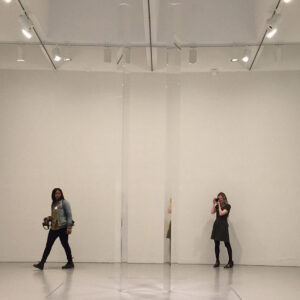My wife and I spent most of the month of June in Greece in the company of some fine poets. Twice postponed by the COVID pandemic, the long-awaited writing retreat proved rejuvenating and productive. Jill and I had visited Athens and the sleepy island of Serifos before, so we knew what beauty awaited, but the incomparable blueness of the Aegean, the serenity of uncrowded beaches, and the delight of dining at seaside tavernas exceeded our memories, already made sweeter by months of waiting. As in Italy, it takes some effort to find an ugly view or a bad meal in Greece.
Greece, again like Italy, is so steeped in history that one can barely sink a spade into the ground without striking some historical keepsake or remarkable antiquity. Studded with pre-Christian temples and blue-domed Orthodox churches, the windblown Greek landscape exudes spiritual presence—the Greek word, pneuma, meaning wind, breath, and spirit all at the same time. On its beaches and summertime tourist sites, Greece also displays an array of human bodies, some more conventionally eye-pleasing than others, but all of them unique and wonderful. Having visited the Athenian agora where Plato walked, the Areopagus where Saint Paul preached, and the Cretan port of Heraklion where Nikos Kazantzakis was born, I begin to see why the eastern Mediterranean prompted so many to ponder where and how spirit or soul and flesh interact.
For Plato, the fleeting, sensible things of this world (Doxa in Greek, from dokein, “to appear” or “to seem”) are no more than poor copies of their permanent, ideal forms (eidos in Greek) above, a sharp distinction called “Platonic dualism.” Saint Paul, however, gets a bad rap as a radical dualist, having for so long been viewed through a distorting Platonic—and later, a Cartesian—lens. As a first century Jewish student of Torah, Paul was no enemy of the body, using its Greek equivalent, soma, as a metaphor for the church (1 Corinthians 12) and the locus of redemption in the Spirit (Romans 8). It’s the word “flesh,” sarx in Greek, that Paul uses as a blanket term for those human desires and habits that alienate humanity from its creator. Here, one might note that the Greek words for “spirit” (pneuma) and “soul” (psyche) are sometimes distinguished in scripture (Genesis 2:7, Hebrews 4:12), a point I’ll return to in a moment.
Kazantzakis may be less familiar to some readers, but his novels are often described, as on the back cover of God’s Pauper —his fictional biography of Saint Francis of Assisi—as depicting “the eternal struggle between the spirit and the flesh.” Read in Pauline terms, this isn’t entirely wrong, but what readers of Kazantzakis—and perhaps the author himself —mean by “flesh” seems all but indistinguishable from “body.” Kazantzakis’s Francis is obsessed with punishing his body to better apprehend the spirit. In Zorba the Greek, the titular character is a cauldron of carnal desires whom the repressed mine-owning narrator —and most readers—can’t help but love and admire. Report to Greco, Kazantzakis’s semi-autobiographical novel, fictionalizes the author’s lifelong search for spiritual and philosophical guides through a labyrinthine quest for transcendent meaning in embodied existence.
I’m a pediatrician by training, so bodies are my business. I could say the same about my writing, which one might describe as an ongoing attempt to render the body in words. Likewise, as a lifelong Catholic Christian (this isn’t the place to discuss the troubled state of the church) sporting a newly minted graduate degree in theology, I’m no stranger to verbal raids on realms of the spirit. Having devoted much of my adult life to the applied science of medicine while gesturing toward ineffable mystery in my various writing endeavors, I get a sense of what John Keats meant by “negative capability”. Yet even committed atheists smuggle so-called “religious” language—often assiduously disguised—into physician-patient conversations when death looms. Call it “intimations of immortality” or “spandrels of primate evolution,” but humans find it hard to shake the intuition that there’s something more to us than the physical.
I’m no fan of stark dualisms. I prefer dwelling in mystery to defending grim certainties. At its best, the Catholic tradition is much less a matter of “either/or” than “both/and,” and regarding the body’s relation to spirit or soul, most Jewish and Christian traditions agree. Against the gnostic dualism infecting so much of North American Christianity with an impoverished view of matter, the scriptural tradition is clear: the body is neither a dry husk shed in death to release the inner spirit nor a milk chocolate layer masking the creamy nougat center of the soul. Spirit and matter are somehow united in the soul. Citing Genesis 2:7 (“Then the Lord God formed man from the dust of the ground and breathed into his nostrils the breath of life, and the man became a living being.”), Wendell Berry writes:
The formula given…is not man = body + soul; the formula there is soul = dust + breath. According to this verse, GOD did not make a body and put a soul into it, like a letter into an envelope. He formed man of dust; then, by breathing His breath into it, He made the dust live. The dust, formed as man and made to live, did not embody a soul; it became a soul. “Soul” here refers to the whole creature. Humanity is thus presented to us, in Adam, not as a creature of two discrete parts temporarily glued together but as a single mystery.
I quote Berry here not as a highly credentialed academic scripture scholar (his use of gender-exclusive language should make that clear) but as a profound and insightful author who has devoted much of his career countering the pernicious abstractions of an economy based on endlessly expanding consumption and the pious otherworldliness of culturally accommodated North American “religion.” Many today rightly distrust our failing economic, political, and religious institutions. What often assumes their place in people’s lives, however—world-wasting consumerism; bitterly absolutist political tribes; and sentimentalized “just be yourself” spiritualities—further enthrall us to ancient dualisms. Unlike Plato, Paul’s gnostic interpreters, or certain readers of Kazantzakis, however, the body and material world are now not so much denigrated as made into what philosopher Martin Heidegger called a “standing reserve” to be used and reshaped according to the desires of the individual will, that disembodied aspect of ourselves usurping the role once claimed by spirit or soul. It takes someone like Berry, with his broad reading, real-world experience, unconventional perspective, and linguistic clarity, to untangle modern versions of an enduring mistake.
I doubt traveling to Greece is necessary to ponder such immensities. Berry seems to do just fine from Henry County, Kentucky. Yet ponder them we must, if only because such implicit convictions lie buried in our everyday behaviors of buying and selling, growing and eating, giving and taking, none of which seem healthy of late. As James Baldwin wrote in another context, “Not everything that is faced can be changed, but nothing can be changed until it is faced.”
Brian Volck is a pediatrician and writer living in Baltimore. He is the author of a poetry collection, Flesh Becomes Word, and a memoir, Attending Others: A Doctor’s Education in Bodies and Words. His website is Brianvolck.com





